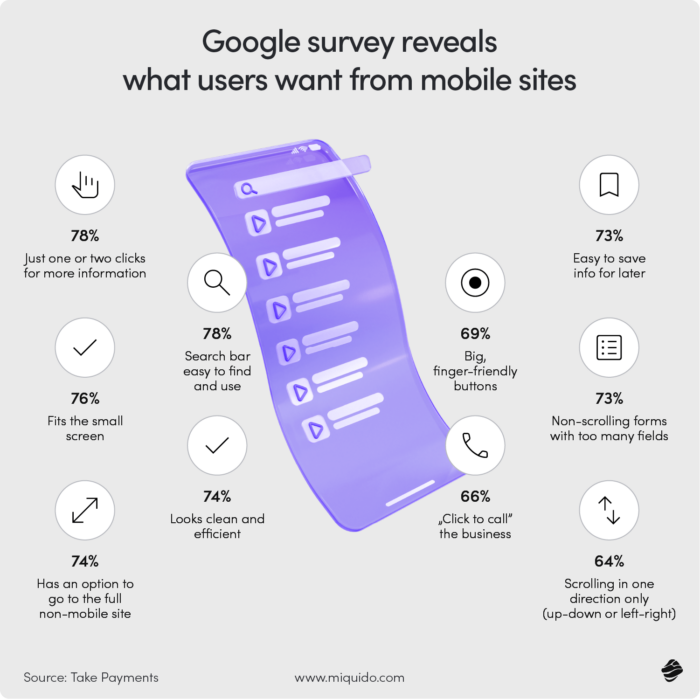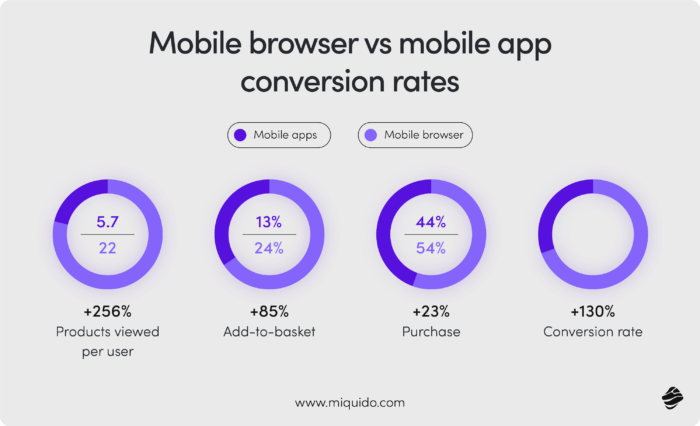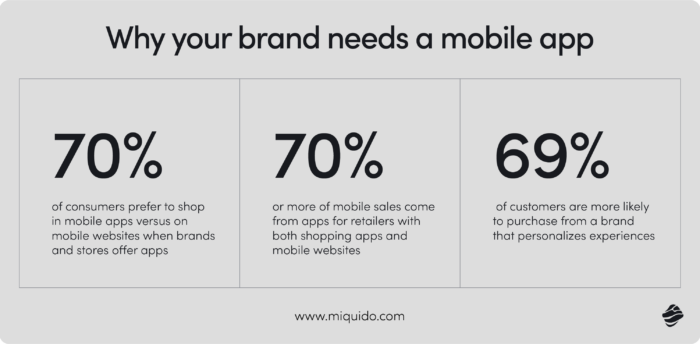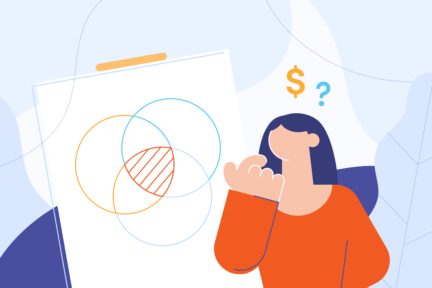It’s official: We’re waking up in a world where mobile search exceeds desktop queries. Over 90% of internet users own a smartphone, and smart devices – TVs, watches, wristbands, and even smart home assistants – are more integrated into daily life than ever before. Are you sure you’re ready for this?
We’re living in a world where mobile search dominates, voice search is more prevalent, and AI-powered assistants are reshaping how we access information.
According to Statista (2025), the number of unique internet users stood at 4.28 billion, with over 90% of them going online on their mobile devices. The use of smart devices is on the increase, too. Globally, there were more than 18 billions IoT devices in 2024. This number is forecasted to triple and hit 32.1 billion in 2030.
Considering the data, if your business is not adjusted to the mobile change yet, it’s high time for the switch. Don’t let yourself be left out of the race!
Instead, follow the expectations of your users and make your app respond to the market trends and customer needs. Get to know why (and how) creating a custom mobile app may give your business a major boost.
Business benefits of mobile applications
Mobile apps are no longer just an option – they’re a necessity.
In an era where app users expect seamless, on-the-go experiences, a well-designed mobile app can be the key to unlocking engagement, efficiency, and growth. Whether it’s boosting brand loyalty, driving sales, or optimizing operations, the right mobile solution delivers real, measurable impact.
Mobile apps outperform mobile browsers
Evolution (and Google) force businesses to have mobile-responsive websites. Smartphones are becoming your clients’ primary device for accessing the Internet and the object they interact with most often (even more than with other people!). Research shows that time spent on media through mobile apps is 89% vs. 11% spent through the mobile web. So what do you need to do to be a step ahead of the competition and even more customer-friendly? You clearly need an app. Faster access, more options, and only a click away!
The numbers speak for themselves. Mobile apps benefit businesses like never before. In 2024, global mobile app revenue surpassed $935 billion. On top of that, the average smartphone owner interacts with 10 apps daily and uses 30 different apps each month.
Now, do the math. The conclusion is obvious: You need an app. It’s the fastest way to connect with users, streamline services, and keep your business just a tap away.
Mobile apps bring more sales
The mobile app experience is simply more customer-friendly and trustworthy than the UX of web pages in mobile browsers. This fact reflects in the percentage of sales delivered with both sources. According to the newest data, 79% of customers order via mobile devices.
Why is the difference so clear?
Simple: Convenience wins. A web store checkout often means manually entering a long list of details every time:
- Name
- Credit card number
- Expiration date
- CVV
- Shipping & billing address
Filling these in every time you make your order is extremely inconvenient for the customer. Plus, if you’re doing it using a small smartphone screen, it’s very easy to lose motivation and give up your purchase.
At the same time, mobile apps enable ordering within just a few taps on the screen. Here, the process is simple. Once set up, the mobile app saves your personal details and doesn’t require the customer to fill them over and over again while finalising the purchase. With a mobile app, your customers stay engaged, complete more transactions, and keep coming back.
Mobile apps build stronger brand
A mobile app isn’t just a sales tool, it’s a direct line to your customers and a powerful way to build brand identity. With a well-designed app, you control the look, feel, and user experience, reinforcing your brand’s presence every time a user interacts with it. From customized interfaces and branded content to exclusive in-app experiences, an app creates a consistent, immersive environment that keeps your business top of mind.
The more your customers engage with your app, the stronger their connection to your brand becomes, leading to higher trust, increased loyalty, and long-term growth.
A mobile app serves as a dynamic extension of your brand, offering personalized interactions, seamless accessibility, and a direct channel to engage with your audience.
Mobile apps unlock customer insights
Also, remember that both sales and digital marketing thrive on data. Having your own mobile app doesn’t just streamline transactions – it unlocks a goldmine of customer insights.
With built-in analytics, you can track real-time user behavior, from browsing patterns to purchase frequency and engagement levels. You’ll see which features they love, where they drop off, and what keeps them coming back.
The more you know about your customers, the more precisely you can personalize offers, optimize user experience, and boost retention. Whether it’s targeted promotions, dynamic pricing, or AI-driven recommendations, data-driven decisions lead to higher conversions and stronger brand loyalty.
An app doesn’t just serve your customers – it helps you understand them like never before.
Mobile apps improve customer interactions
Discount coupons, product reviews, loyalty programmes, or additional content useful for your users – these are just a few examples of extra values that your mobile app may provide to your customers.
In July 2024, mobile devices accounted for 53% of online sales during major shopping events, highlighting a shift towards mobile commerce.
If you manage to attract your customers with in-app content or perks and turn them into devoted users, then you’re halfway through to increasing your sales. Retailers with dedicated mobile apps experienced a 7.4% year-over-year sales growth, outpacing the 4.2% growth of those without apps.

But it’s not just about sales – it’s about building stronger customer relationships. Mobile business apps enable:
- Real-time communication: Use chat support, AI assistants, or interactive features to respond instantly.
- Loyalty programs and gamification: Reward users with points, discounts, or exclusive deals.
- Personalized recommendations: AI-driven insights help tailor offers based on behavior and preferences.
When users feel valued and engaged, they spend more, return more often, and become loyal advocates for your brand. By captivating customers with in-app content and benefits, you not only enhance user experience but also drive increased sales and customer loyalty.
Mobile apps improve customer engagement
Do you consider games a pure waste of time? Think again.
Colgate, KFC, Universal Studios — all of these brands created mobile games to draw traffic, increase user engagement or provide more conversions and better ROI. They also use it for analytics and reporting, while delivering simple, sheer fun to their customers. And the momentum isn’t slowing down – app revenues are set to approach $200 billion within the next two to three years. Now is the time to optimize your mobile strategy and capitalize on the future of digital engagement.
Mobile applications – whether games or utility apps helping customers to use your company’s services – are the true leverage for businesses and a direct response to mobile users demands.
Mobile apps allow to connect with the customer
Major brands like Macy’s, CVS, and Groupon are leveraging push notifications to drive engagement – and for good reason. When used strategically, push messages don’t just increase app launches (by 3x on average). They retain users, boost conversions, and keep your brand top of mind.
With location-based targeting, you can send personalized, timely offers that drive both online and in-store traffic. The key? Relevance. Deliver tailored deals and valuable content, and watch your customer satisfaction skyrocket.
There are a number of ways to increase user engagement, however, each aims to better understand the customer’s needs and tailor your product to them.
Successful mobile apps across industries

Mobile app development for banking
Nextbank was the direct answer to the needs of the Filipino people. In 2007, when Nextbank’s journey started, there was no central banking system anywhere in the archipelago. With more than 500 standalone, analogue micro banks spread across the islands, money management was troublesome for both tourists and locals.
Costly banking platforms like Oracle were not an option since:
- they didn’t support some specific local procedures, e.g. group loans;
- they were overkill, as only 23% of citizens owned some kind of bank account at that time.
Nexbank gave people the freedom of travelling from island to island, managing their money easily and conveniently through the mobile app. Hosted in the cloud and fully customised for the target market, the banking app development brought about the digital transformation of the banking system of the Philippines.
Nextbank was selected as a Finalist of the Singapore FinTech Festival 2018 and 2019, and it took 2nd place in the category of ‘ASEAN Fintech’ in 2020.
Mobile app development for healthcare
Vheda Health is an example of a mobile app that simplifies the process of managing chronic diseases. The app helps patients form an actionable care plan and follow it on a daily basis. It also arranges weekly live video calls between the patient and the care team.
According to estimates, Vheda Health’s app saves patients an average of $15,000 by preventing the need for hospitalisation. It puts the focus on prevention rather than costly healing.
So, if you’re thinking of a healthcare app that meets the pain points of the smartphone users – Vheda Health is the best example of a screaming success and well-executed mission.
Mobile app development for entertainment:
In 2018, Abbey Road Studios, the legendary recording studio known for producing The Beatles, Pink Floyd, and Lady Gaga, decided to create the first-ever music application which lets artists save their music ideas before they’re gone.
Their Topline app enables artists to record their tracks, add lyrics, share files and sync them easily to the cloud, saving space on their mobile device.
The app is a jewel not only because of the famous brand or its adjustment to the needs of its users.
It is not easy to build a music app in a really short time. But it is possible. The Topline native iOS app and its version in Flutter early alpha was developed in just 10 weeks. However, this does not compromise the quality of the app, which is noted for its technical background. It overcame audio latency issues on Android. For the pioneering use of Flutter framework, the app was featured on Google I/O 2018 and Flutter Live 2018. It was also showcased by Google in their Flutter Developer Stories and announced as a winner of the UK App Awards 2018 in two categories.
Build your mobile application for business leverage!
All the examples of applications mentioned above were successfully developed by the Miquido team.
If you are thinking about joining the leaders and creating mobile apps for your business, a successful custom app development company is the basis for launching your unique digital project.








